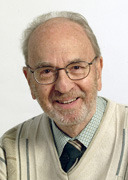Kenneth Wade facts for kids
Quick facts for kids
Kenneth Wade FRSC FRS
|
|
|---|---|
 |
|
| Born | 13 October 1932 Sleaford, Lincolnshire, UK
|
| Died | 16 March 2014 (aged 81) Stroud, Gloucestershire, UK
|
| Nationality | English |
| Citizenship | United Kingdom |
| Alma mater | University of Nottingham |
| Known for | Polyhedral skeletal electron pair theory |
| Awards | Ludwig Mond Award (1999) |
| Scientific career | |
| Fields | Electrochemistry |
| Institutions | Durham University |
| Doctoral advisor | Norman Greenwood |
Kenneth Wade was a British chemist and a professor at Durham University. He was known for creating "Wade's Rules," which help scientists understand the shapes of certain chemical structures.
Early Life and Education
Kenneth Wade was born in Sleaford, England, on October 13, 1932. He was the second son of Harry and Anna Wade. He went to Carre's Grammar School for his early education.
He later studied at the University of Nottingham. There, he became the very first PhD student of a famous chemist named Norman Greenwood. Kenneth Wade also studied at Cornell University in the United States.
Kenneth Wade's Career
After finishing his studies, Kenneth Wade worked as a researcher at the University of Cambridge. He also taught at Cornell University and Derby College of Technology.
In 1961, he joined Durham University as a lecturer. He became a Senior Lecturer in 1971 and a Reader in 1977. From 1983 to 1998, he was a Professor of Chemistry at Durham University. He even led the Chemistry Department from 1986 to 1989.
What are Wade's Rules?
Wade's Rules are a special set of guidelines in chemistry. They are also called the Polyhedral skeletal electron pair theory. These rules help chemists predict the shapes of tiny chemical structures called borane clusters. Imagine trying to figure out how atoms will arrange themselves in a complex molecule; Wade's Rules help make sense of it!
Awards and Honors
Kenneth Wade received many important awards for his work in chemistry:
- 1982: Main Group Award from the Royal Society of Chemistry.
- 1989: He became a Fellow of the Royal Society, which is a very high honor for scientists.
- 1999: He received the Tilden Prize from the Royal Society of Chemistry.
- 1999: He was given the Ludwig Mond Award, also from the Royal Society of Chemistry.
- 2012: He received the Chancellor's Medal from Durham University.
 | Audre Lorde |
 | John Berry Meachum |
 | Ferdinand Lee Barnett |

